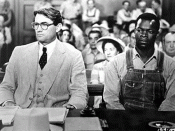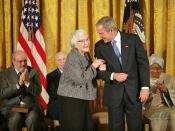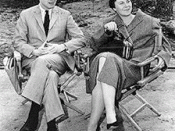Harper Lee's, To Kill a Mockingbird tells both the story of a family and of the entire town in which they live, when both are placed into a scandalous moral and ethical dilemma; a conflict that tests the limits of their bravery and the power of their courage. One of the novel's primary concerns is courage, and its narrator, Scout Finch (a girl not yet six at the novel's start), sees the true nature of courage in her father. The intellectual and moral courage of her father's book smarts is more real and alive than even the physical glory of battlefield courageousness. To Scout, and perhaps to Harper Lee as well, Atticus Finch, "who hated guns and had never been to any wars, was the bravest man that ever lived" {p. 116}.
Atticus Finch, the wise father, is also a shrewd defense attorney who takes the case of a black man (convicted of a white woman's rape), despite the scrutiny and hatred this generates within the town of Macomb, Alabama.
The novel, (through the focus of Scout's growing eyes), portrays a deep respect for the man's integrity of character and free-thinking bravery. Atticus Finch displays the kind of courage and bravery that enables someone's "conscience" to never "abide by majority opinion". {p. 120}
When the elderly Mrs. Dubose says that Atticus is "no better than the niggers and trash he laws for!", {p. 117} he hardly takes it as an insult, because he does not think himself better than those men, or any others for that matter. That ability, is proof of not only his courage and his confidence, but of his humility. It takes a rare sort of bravery and security to stand with even the lowest of men as your brothers.
Atticus Finch is fighting an uphill battle...



Very very good
too many commas. e.g. "That ability, is proof of ... " when it should have just been "That ability is proof of ..."
otherwise very good.
1 out of 1 people found this comment useful.